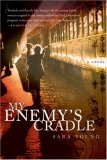Summary | Excerpt | Reviews | Beyond the Book | Readalikes | Genres & Themes | Author Bio

ONE
SEPTEMBER 1941
"Not here, too! Nee!"
From the doorway, I saw soup splash from my aunt's ladle onto the tablecloth.
These days, there was no fat in the broth to set a stain; still, my heart
dropped when she made no move to blot the spill. Since the Germans had come, she
had retreated further into herself, fading away in front of me so that sometimes
it was like losing my mother all over again.
"Of course here, Mies," my uncle scoffed. His pale face pinked with the
easy flush of red-haired men, and he leaned back and took off his glasses to
polish them on his napkin. "Did you think the Germans would annex us as a refuge
for Jews? The question is only why it took so long."
I brought the bread to the table and took my seat. "What's happened?"
"They posted a set of restrictions for Jews today," my uncle said.
"They'll
scarcely be able to leave their homes." He inspected his glasses, put them back
on. And then he turned to look at me directly.
I froze, my fingertips whitening around my spoon, suddenly reminded of
something I'd witnessed in childhood.
Walking home from school, a group of us had come upon a man beating his dog.
All of us shouted at him to stop—our numbers made us brave—and some of the
bigger boys even tried to pull him off the poor animal. A boy beside me caught
my attention; this boy, I knew, was himself often beaten by the older boys. He
was crying, "Stop! Stop it!" along with the rest of us. But something in his
expression chilled me: satisfaction. When my uncle turned to look at me, I saw
that boy's face again.
"Things will be different now, Cyrla."
I dropped my gaze to my plate, but I felt my heart begin to pound. Was he
weighing the risk of having me in his home?
His home. I stared down at the white tablecloth. Beneath it, a table rug was
edged with gold silk fringe. When I had first arrived it had seemed strange to
cover a table this way, but now I knew every color and pattern of its design. I
lifted my eyes to take in the room I had come to love: the tall windows painted
crisp white overlooking our small courtyard; the three watercolors of the
Rijksmuseum hanging in a column on their braided cord; the glimpse into the
parlor beyond the burgundy velvet drapes, where the piano stood in the corner,
necklaced with framed photographs of our family. My heart began to beat even
faster—where did I belong if not here?
I glanced at my cousin—Anneke was my safe passage through the treacherous
landscape of my uncle's world. But she had been distracted all day, drifting
away whenever I'd tried to talk to her, as if she was harboring a secret. She
hadn't even heard her father's threat.
"What?" I kept my voice calm. "What will be different here?"
He was cutting the bread. He didn't stop, but I saw the warning look he gave
my aunt. "Everything." He cut three slices from the loaf and then laid the knife
down carefully. "Everything will be different."
I drew the loaf toward me, picked up the knife as deliberately as a chess
piece, and cut a fourth slice. I laid the knife back on the board, then placed
my hands on my lap so he wouldn't see them trembling. I lifted my chin and
leveled my eyes at him. "You counted wrong, Uncle," I said. He looked away, but
his face was dark as a bruise.
At last the meal was over. My uncle returned to his shop to take care of his
bookkeeping, and my aunt and Anneke and I cleared the table and went into the
kitchen to wash the dishes. We worked in silence; I in my fear, my aunt in her
sadness, Anneke deep in her secret.
Suddenly Anneke cried out. The bread knife clattered to the floor and she
held up her hand; blood streamed into the basin of suds, tingeing the bubbles
pink. I grabbed a dishcloth and pressed it around Anneke's hand, then led her to
the window seat. She sank down and stared at the blood seeping through the
dishcloth as though it was a curiosity. I grew afraid, then. Anneke was vain
about her hands, would go without her ration of milk sometimes to soak them in
it instead, and she could still find nail polish when it seemed no one in
Holland had such a luxury. If she didn't carry on about a cut deep enough to
scar, then her secret was very big.
Copyright © 2008 by Sara Young. All rights reserved. No part of this publication may be reproduced or transmitted in any form or by any means, electronic or mechanical, including photocopy, recording, or any information storage and retrieval system, without permission in writing from the publisher.




The silence between the notes is as important as the notes themselves.
Click Here to find out who said this, as well as discovering other famous literary quotes!
Your guide toexceptional books
BookBrowse seeks out and recommends the best in contemporary fiction and nonfiction—books that not only engage and entertain but also deepen our understanding of ourselves and the world around us.